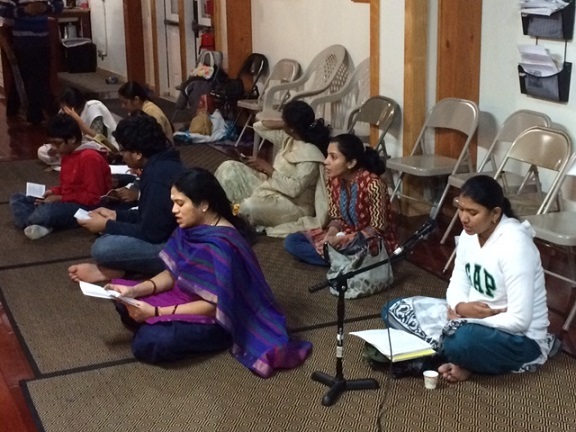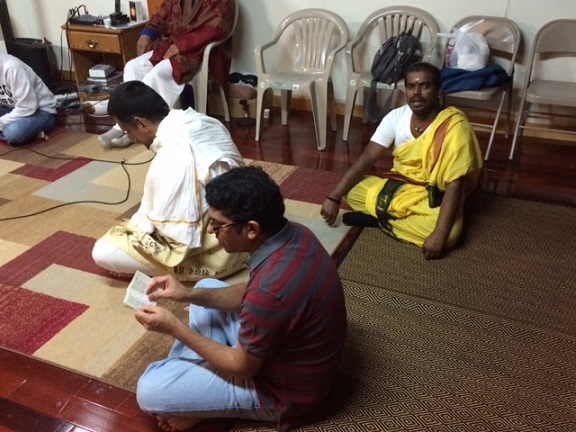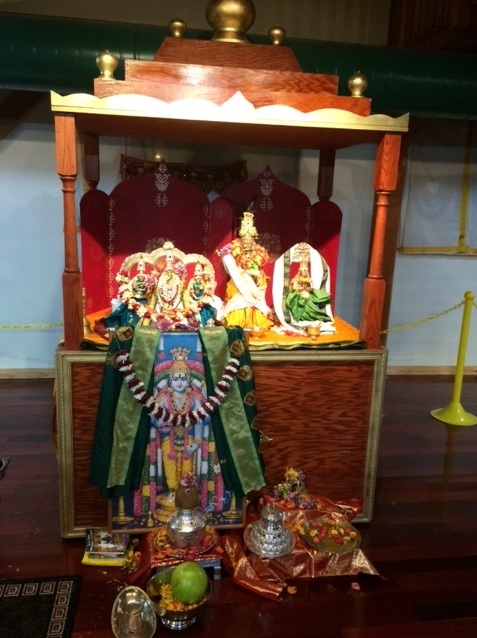Contribute
| Sri Vishnu Sahasranama: Akhanda Parayana At The Hindu Temple Of New Hampshire |
K. Arvind
12/04/2014
The Hindu Temple of New Hampshire, Nashua, NH, held an Akhanda Parayana (Uninterrupted Recitation) of the Sri Vishnu Sahasranama Stotra over the Thanksgiving weekend with the intent of seeking the grace of the almighty for world peace. This is the second year that the Temple is holding this event. Chanting Marathon Devotees of the Hindu Temple of New Hampshire chanted in chorus, the 1000 auspicious names of Lord Sri Vishnu, set to a melodious rhythm that was popularized in the rendering by the legendary singer Smt. M.S. Subbulakshmi. The 1000 names that start with “Vishwam†(the one who is the entire Universe) and that end with “Sarva Praharanaayudha†(wielder of all weapons) were recited over and over by the assembled devotees with each round followed by the hymn “Vanamaali Gadi Shaarngi …,†a prayer to Lord Sri Vishnu seeking his protection,. This marathon session that started on the morning of Saturday, November 29th, 2014 stretched for over 24 hours, with many dedicated devotees staying through the entire session. At approximately 15 minutes per round of 1000 names, names of the Almighty were chanted by the devotees approximately a hundred thousand times over the entire session, thereby sanctifying the Temple and the minds of the devotees. “Namasmarana†or dwelling on the names of the Lord is a powerful device that is prescribed in most Hindu traditions as a way to receive the grace of the divine and attain happiness in life. This practice which tends to focus the constantly wavering mind on the attributes and characteristics of the divine, often takes the form of reciting Sahasranama Stotras (a compilation of 1000 names) associated with various deities. These stotras in the expressive Sanskrit language, evoke forms and names associated with these forms (“saguna brahmanâ€) to help the devotee in the early stages of self-realization comprehend the all-encompassing divinity that has neither form nor name (“nirguna brahmanâ€). Some popular Sahasranama Stotras include the “Sri Vishnu Sahasranamaâ€, “Sri Lalita Sahasranamaâ€, and “Sri Lakshmi Sahasranamaâ€. Sri Kanchi Paramacharya explains the significance of Sahasranama Stotras in a 15 minute discourse in Tamil available at the following link: http://bit.ly/1ybMzyP Sri Vishnu Sahasranama The Sri Vishnu Sahasranama Stotra enjoys a special place in the Hindu way of life. A popular nugget of wisdom states the following: सà¥à¤µà¤¶à¤¾à¤–ोपनिषद गीता विषà¥à¤£à¥‹à¤°à¥à¤¨à¤¾à¤®à¤¸à¤¹à¤¸à¥à¤¤à¥à¤°à¤•à¤‚ | svashaakopanishad geeta vishnornaamasahastrakam रà¥à¤¦à¥à¤°à¤‚च पौरà¥à¤·à¤‚ सूकà¥à¤¤à¤®à¥ नितà¥à¤¯à¤®à¤¾à¤µà¤°à¥à¤¤à¥à¤¤à¤¯à¥‡à¤¤à¥ बà¥à¤§à¤ƒ || rudramcha paurusham sooktam nityamaavartayet budah “The wise chant daily the Upanishad from their lineage, the Gita, the Vishnu Sahasranamam, Rudram and Purusha Suktham.†In fact, the Sri Vishnu Sahasranama Stotra is so special that, the term “Sahasranama†without specifying any qualifying deity is usually understood as referring to Sri Vishnu Sahasranama. There is also a legend that describes how Sri Adi Shankara, who set out to write a commentary on Sri Lalita Sahasranama was redirected by divine intervention to write a commentary on Sri Vishnu Sahasranama instead. Yudhistira’s Questions The origins of this exalted stotra can be found in the Hindu epic Mahabharata which was narrated by Sri Veda Vyasa, the compiler of the Vedas, which constitute the foundations of Hindu thought. The setting is Kurukshetra, the battlefield where Bheeshma, the highly venerated elder of the Kuru clan is lying on a bed of arrows, waiting to choose his moment of departure from this world. Yudhishtira, the embodiment of righteousness, and the eldest of the Pandavas, approaches Bheeshmacharya with half a dozen questions: किमेकं दैवतं लोके किं वापà¥à¤¯à¥‡à¤•à¤‚ परायणं | kimekam daivatam loke kin vaapyekam paraayanam | सà¥à¤¤à¥à¤µà¤¨à¥à¤¤à¤ƒ कं कमरà¥à¤šà¤¨à¥à¤¤à¤ƒ पà¥à¤°à¤¾à¤ªà¥à¤¨à¥à¤¯à¥à¤°à¥à¤®à¤¾à¤¨à¤µà¤¾: शà¥à¤à¤‚ || stuvantah kam kamarchantah praapnuyurmaanavaah shubham || को धरà¥à¤®: सरà¥à¤µ धरà¥à¤®à¤¾à¤£à¤¾à¤‚ à¤à¤µà¤¤: परमो मत: | ko dharmah sarva dharmaanaam bhavatah paramo matah | किं जपान मà¥à¤šà¥à¤¯à¤¤à¥‡ जनà¥à¤¤à¥à¤°à¥à¤œà¤¨à¥à¤® संसार बनà¥à¤§à¤¨à¤¾à¤¤à¥ || kim japan muchyate jantur janma samsaara bandhanaat || “Who is the supreme Lord and refuge of all, and by the worship and praise of who man receives all that is beneficial, and attains salvation?†Bheeshma’s Answers Sri Vishnu Sahasranama, the thousand names of Sri Vishnu is the answer given by Sri Bheeshmacharya to these questions: जगतà¥à¤ªà¥à¤°à¤à¥à¤‚ देवदेवमननà¥à¤¤à¤‚ पà¥à¤°à¥à¤·à¥‹à¤¤à¥à¤¤à¤®à¤‚ | jagatprabhum devadevam anantam purushottamam | सà¥à¤¤à¥à¤µà¤¨à¥ नामसहसà¥à¤¤à¥à¤°à¥‡à¤£ पà¥à¤°à¥à¤·: सततोतà¥à¤¥à¤¿à¤¤à¤ƒ || stuvan naamasahastrena purushah satatothtitah || तसà¥à¤¯ लोक पà¥à¤°à¤§à¤¾à¤¨à¤¸à¥à¤¯ जगनà¥à¤¨à¤¾à¤¥à¤¸à¥à¤¯ à¤à¥‚पते | tasya loka pradhaanasya jagannaatasya bhoopate | विषà¥à¤£à¥‹à¤°à¥à¤¨à¤¾à¤®à¤¸à¤¹à¤¸à¥à¤¤à¥à¤°à¤‚ मे शà¥à¤°à¥à¤£à¥ पापà¤à¤¯à¤¾à¤ªà¤¹à¤‚ || vishnornaamasahastram me shrunu paapabhayaapaham || “He will be free from all sorrows, who praises the supreme Lord using his thousand names. Here from me the thousand names of the supreme Lord Vishnu, the absolver of all sins and remover of all worldly fears†A Thousand Names Bheeshmacharya then goes on to list a thousand names which describe various attributes and characteristics of the divine in the form of Lord Sri Vishnu. Among the names used to describe the Supreme Lord include: Vishnu (all-pervading), Bhuta-Bhavya-Bhavat Prabhuh (Master of the past, present and future), Bhutakrut (the creator and destroyer of everything), Bhutatma (the in-dweller in all), Pootatama (pure), Paramatma (Supreme One), Avyayah (unaging), Yogavidaam Neta (Master of those established in Yoga), Sriman (in whom Sri Lakshmi resides), Sakshi (Witness to all), Shiva (Auspicious), Sthanu (Steady and immovable), Agrahya (incomprehensible), Shaasvata (eternal), Shreshta (deserving the highest praise), Ishwara (the omnipotent being), Medhavi (one of great intelligence), Samvatsara (Year - he is Time), Ajah (one who has no birth), Satya (Truth), Amogha (one whose worship will never go in vain), Rudra (remover of sorrows), Amrutah (eternal), Vedavit (one who knows the Veda), Dharmadhyaksha (one who oversees Dharma), Chaturbhujah (one with four arms), Guru (teacher), Sahasraksha (one with a thousand eyes), Mahendra (God of all gods), Mantra (one who is known through mantras), Govinda, Chakra-Gada Darah (one who holds the discus and the mace), Bishak (physcian) and Vasupradah (one who bestows wealth in abundance). While the literal meanings of the names given here convey the underlying attributes to some extent, the best and most enjoyable way to experience the essence of Sri Vishnu Sahasranama is to listen to discourses by popular scholars and exponents including Sri Kanchi Paramacharya (Tamil), Sri Sengalipuram Anantharama Dikshitar (Tamil), Sri Vellukudi Krishnan Swamy (English/Tamil), Sri Arulmallige Parthasarathy (Kannada), Swami Sri Sarveshananda (English), and Sri U. Ve. Dushyant Sridhar (Tamil). Hindu Temple of New Hampshire The Hindu Temple of New Hampshire based in Nashua, NH has been serving the Nashua and Greater Boston community for over 6 years. Started in a rented premises by a small group devotees in 2008 with a mission of serving the growing Hindu population in the area, the Temple is now located in its own beautiful facility at 525, Broad Street, Nashua, NH, about 45 minutes north-west of Boston. The Temple (in its earlier locations) has been graced by prominent spiritual leaders including Sri Sri Ravi Shankar and Sri Vellukkudi Krishnan Swami, and Sri Arulmallige Parthasarathy. Bharathi Vidyashram, the cultural school associated with the Temple, offers language, music, culture and leadership classes for children, and also organizes events such as seminars by speakers, music concerts, and other cultural programs. We invite you to visit the Hindu Temple of New Hampshire and be part of the Temple community. In addition to daily poojas (nitya aradhana), and darshan, the Temple conducts special poojas on recurring special occasions such as Pradosham and Chaturthi, and celebrates all major Hindu festivals. The Hindu Temple of New Hampshire is 501c(3) certified. य इदं शà¥à¤°à¥à¤£à¥à¤¯à¤¾à¤¨à¤¿à¤¤à¥à¤¯à¤‚ यशà¥à¤šà¤¾à¤ªà¤¿ परिकीरà¥à¤¤à¤¯à¥‡à¤¤ | ya idam shrunuyaanityam yashchaapi parikeertayet | नाशà¥à¤à¤‚ पà¥à¤°à¤¾à¤ªà¥à¤¨à¥à¤¯à¤¾à¤¤à¥à¤•à¤¿à¤¨à¥à¤šà¤¿à¤¤à¥ सोमà¥à¤¤à¥à¤°à¥‡à¤¹ च मानव: || naashubham praapnuyaatkinchit somutreha cha maanavah || “Nothing evil or inauspicious will befall a man who hears or chants these names daily†- Phala Shruti - Sri Vishnu Sahasranama Stotra. Acknowledgements The following sources were consulted for this article:
You may also access this article through our web-site http://www.lokvani.com/


